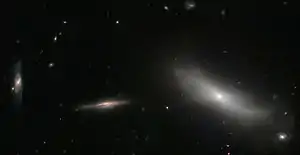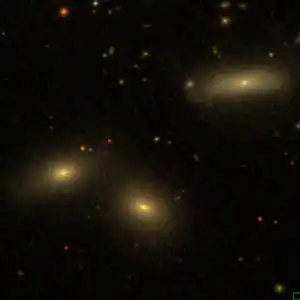NGC 1190
NGC 1190 is a lenticular galaxy approximately 109 million light-years away from Earth in the constellation of Eridanus.[1] It was discovered by American astronomer Francis Leavenworth on December 2, 1885 with the 26" refractor at Leander McCormick Observatory.[3]
| NGC 1190 | |
|---|---|
 NGC 1190 (right) as seen by (NASA/ESA HST) | |
| Observation data (J2000.0 epoch) | |
| Constellation | Eridanus |
| Right ascension | 03h 03m 26.13s [1] |
| Declination | −15° 39′ 42.80″ [1] |
| Redshift | 0.008733 [1] |
| Heliocentric radial velocity | 2618 ± 27 km/s [1] |
| Distance | 109 Mly |
| Apparent magnitude (V) | 14.20 [2] |
| Apparent magnitude (B) | 15.20 [2] |
| Characteristics | |
| Type | S0^0 [1] |
| Apparent size (V) | 0.9 x 0.3 [1] |
| Other designations | |
| PGC 11508, MCG -3-8-62, HCG 22B | |
NGC 1190 is dominated by stellar light with little long wavelength emission.[4]
Together with NGC 1189, NGC 1191, NGC 1192 and NGC 1199 it forms Hickson Compact Group 22 (HCG 22) galaxy group.[5] Although they are considered members of this group, NGC 1191 and NGC 1192 are in fact background objects, since they are much further away compared to the other members of this group.[4]
Image gallery
See also
References
- "NASA/IPAC Extragalactic Database". ned.ipac.caltech.edu. Retrieved December 9, 2017.
- "Revised NGC Data for NGC 1190". spider.seds.org. Retrieved December 9, 2017.
- "Data for NGC 1190". www.astronomy-mall.com. Retrieved December 9, 2017.
- Johnson, Kelsey E.; et al. (2007). "The Infrared Properties of Hickson Compact Groups". The Astronomical Journal. 134 (4): 1522–1543. arXiv:0706.4461. Bibcode:2007AJ....134.1522J. doi:10.1086/520921. S2CID 38349471.
- "A members-only galaxy club". www.spacetelescope.org. Retrieved December 9, 2017.
External links
Wikimedia Commons has media related to NGC 1190.
- NGC 1190 on WikiSky: DSS2, SDSS, GALEX, IRAS, Hydrogen α, X-Ray, Astrophoto, Sky Map, Articles and images
- SEDS
This article is issued from Wikipedia. The text is licensed under Creative Commons - Attribution - Sharealike. Additional terms may apply for the media files.

